- May 9, 2025
-
-
Loading

Loading
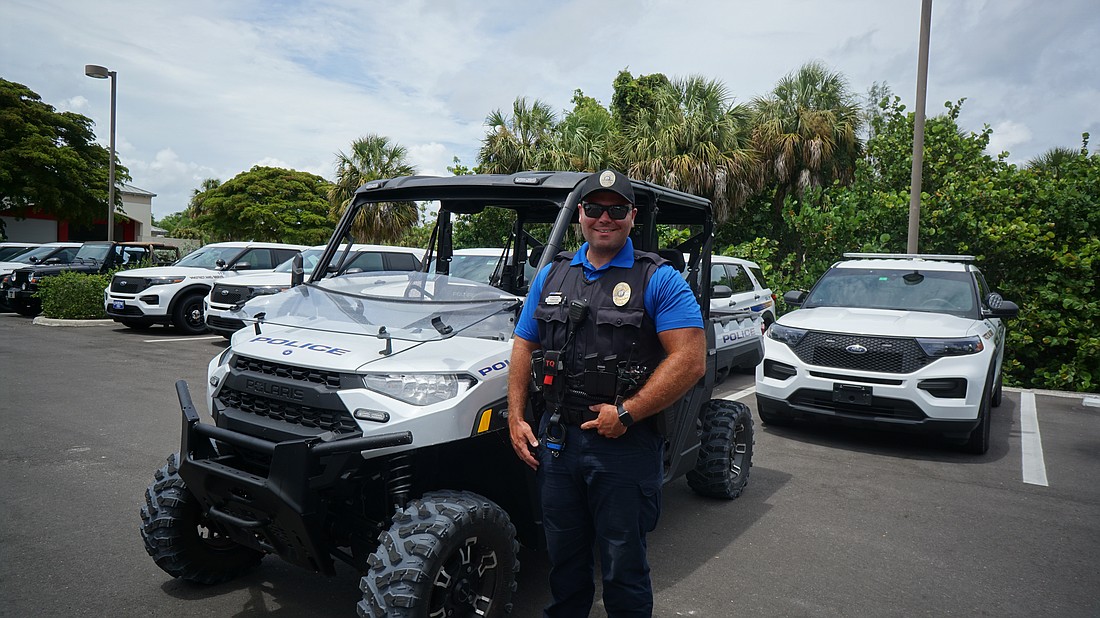
The Longboat Key Police Department’s four-wheeler glided from asphalt to sand with ease at the Broadway Street public beach access.
It was a Saturday afternoon. The sun beat down, but the vehicle provided some shade. The noise of the motor overpowered the sounds of waves and nearby seabirds.
Officer Joe Ferrigine, 27 years old and from New Jersey, patrolled the beach. He was working overtime. He became an officer on Longboat Key about a year and a half ago after starting his career in Asbury Park, New Jersey, and spending some years in Baltimore City, Maryland.
“I used to work in the worst city in America, so this is a big change,” Ferrigine said.
He started at the Broadway Street entrance and drove down the beach before exiting the way he came in. It was time to go to the next access point. The vehicle has a windshield of only 6 inches tall so the wind blows aggressively while going 45 mph down Gulf of Mexico Drive.
“If you tilt your head down a little, your glasses and hat won’t go flying off,” Ferrigine said.
Gulfside Road is the next public access point. After entering this access point, Ferrigine made his first citation stop of the afternoon.
A family had open containers of alcohol, which a town ordinance prohibits on public beaches. Each violation can mean a $100 citation. Oftentimes, like in this case, Ferrigine cuts people a break. If there’s a party with multiple alcoholic beverages, he most likely will only serve one citation.
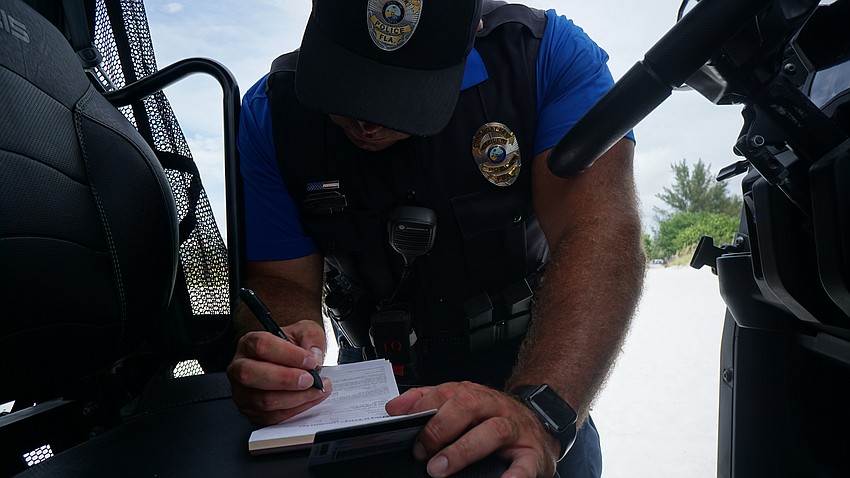
The ordinance has its own caveats. If individuals are in the water or on private property, they can’t be cited for drinking alcohol. Private resorts on Longboat Key also own the beach directly in front of the property to allow guests to bring drinks from the resort bars. In those cases, guests can’t be cited. Only if people have an open alcoholic beverage on the sands of a public beach can they be cited.
Coolers can’t be searched if they’re closed, but if Ferrigine sees alcohol in an open cooler, it’s “fair game,” he said.
“No one’s ever tested me for this before,” Ferrigine said.
That is, until a few minutes later.
Farther down the beach, Ferrigine passed another group’s setup. The four were in the water, but Ferrigine spotted their three Whiteclaw seltzers among their things on the beach. He turned the vehicle around and waited from a distance until they came out of the water. He approached the group and asked for IDs, which they didn’t have.
One of the individuals in the group argued they weren’t doing anything wrong. She claimed they were on a private part of the beach just enjoying their day. Ferrigine calmly reminded the group about the ordinance and clarified that they were not on private property. Voices were raised, and tears began. Two members of the group left to get their IDs from their nearby rental.
In the end, the beachgoers realized they were in the wrong. Since they entered the public beach from a private beach access, they didn’t see the signs that state the rules, they said. The case ended in a single $100 citation.
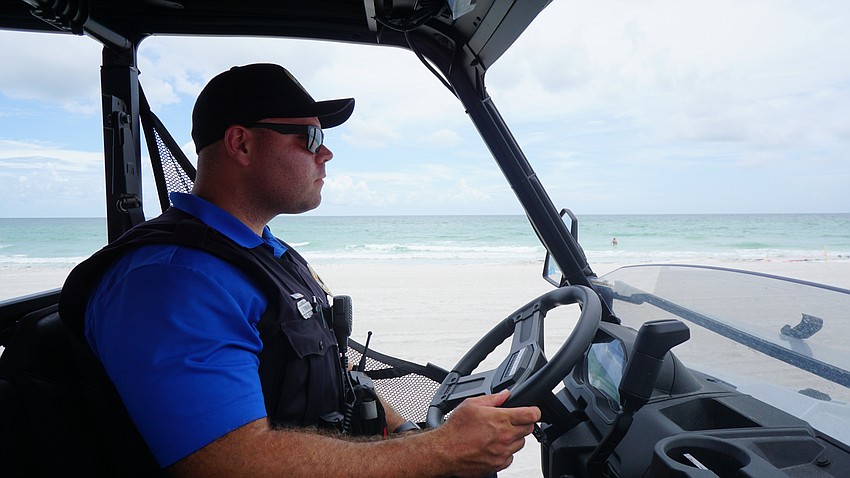
The rest of the stretch yielded no citations, so Ferrigine returned to Gulf of Mexico Drive, headed toward the first beach entrance, and attempted to repeat. A minute into the second patrol, he passed a woman sitting alone on the beach. He whipped the vehicle around and got out as he simultaneously put it in park.
He asked the woman if she was smoking marijuana. She admitted she was. The smell was a dead giveaway, Ferrigine said. She also admitted to having alcohol on the beach.
Possession of marijuana counts as an arrest. Ferrigine called for backup as he and the woman headed to her car. The beach four-wheeler lacks the typical computer that’s mounted in police vehicles, nor does Ferrigine have equipment like evidence bags. Three squad cars pulled up with the sergeant on duty and two additional officers.
After an hour in the sun, Ferrigine served the woman with a citation for the alcohol and a notice to appear in court. The charge was possession of under 20 grams of marijuana. Rather than taking the woman to the station for the arrest, he chose to check her name for warrants in the field, and issued the notice. She was fully cooperative, so this was the ideal route, Ferrigine said.
Ferrigine decided to call it quits for the afternoon. After a ride back to the station, he has to fill out reports for the citations and arrest.
At least he can do that in the air-conditioned station, he said.
On the water, the department’s only marine patrol officer, Josh Connors, also enjoyed the perks of the job: the weather. Being on the water is breezier than the beach. Connors navigated the boat slowly enough so its radio's classic rock could be heard among the radio calls and sounds from nearby vessels.
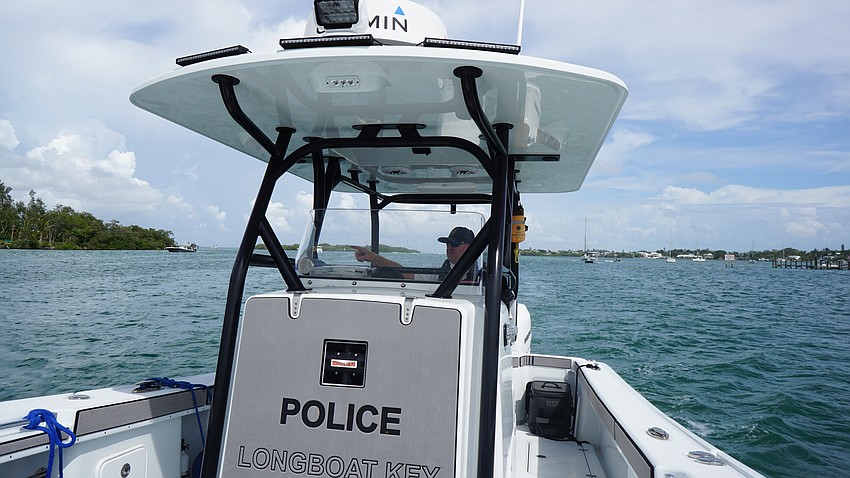
He’s another officer from the northeast, a common trend for Longboat Key officers. Connors spent his life growing up in Cape Cod and, after 10 years of being an officer there, got sick of the damp, cold weather.
Saturday, July 8 was a slow day, possibly because of the partly cloudy weather.
“Seems like a Friday out here,” Connors said. “Not much going on.”
This is Connors’ fifth year with the Longboat Key Police Department. On marine patrol, he mainly sees wake zone and safety violations. He often prefers to educate people rather than issue a citation. But for violations like one earlier in the day when a vessel didn’t have life jackets for the toddlers on board, that’s an automatic citation.
Connors said the best part of the job is “being able to educate people rather than enforce, but enforce when necessary.” Coming from a Coast Guard background, he likes being able to use that knowledge in his full-time job.
When Connors saw a vessel with their registration sticker on the wrong side, he turned on the lights and flagged the group down. The registration sticker violation is just a warning, but Connors said making these stops gives him the ability to do a safety inspection — checking for life jackets, a life preserver and fire extinguisher, all of which are necessary.
Around 3:45 p.m., Connors spotted a dog on Greer Island. He approached the shoreline, and gave the owner a warning that the dog must stay in the water or on the pontoon boat.
After that, the Manatee County Police Department’s new air-conditioned vessel passed Connors.
“You got room for one more in there?” Connors joked.
It’s essential to have a good working relationship with the other departments, Connors said. He works closely with Manatee and Sarasota County Police departments, as well as the Florida Fish and Wildlife Conservation Commission.
“We don’t have much backup on the water,” Connors said.
Connors has noticed most boaters head in for the day around 4 p.m. After one final sweep around Jewfish Key, he decided to call it a day and head back to The Moorings at Longboat Key Club, where the department keeps their Yellowfin boat.
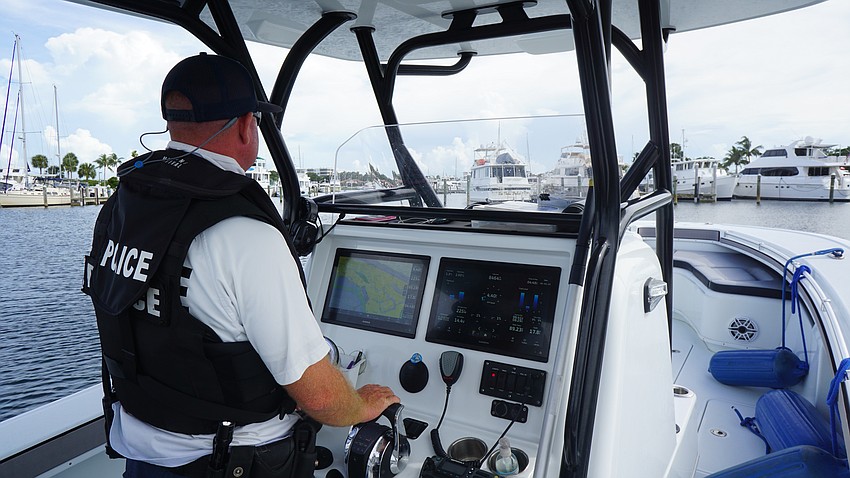
Twelve-hour shifts are common for Connors. His days start with prepping the vessel before heading onto the water and end with cleaning and paperwork. On this Saturday, Connors was on the water from 9 a.m. to 5 p.m. and was scheduled for security detail at a resort from 7-11 p.m.
Toto's “Africa” played on the radio as Connors guided the vessel into its lift. He had to prepare for his second shift.